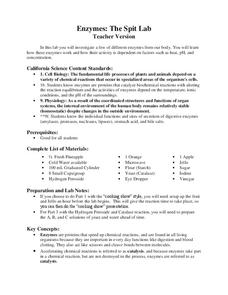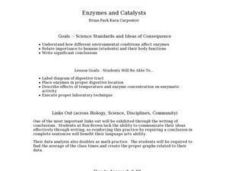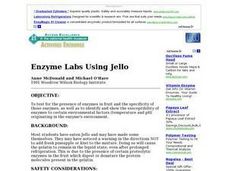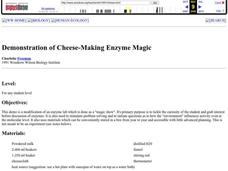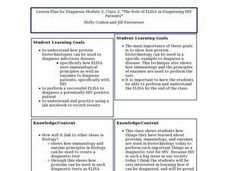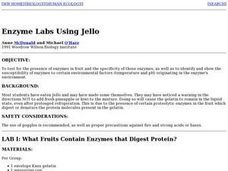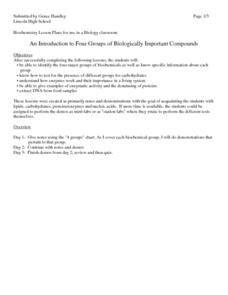American Physiological Society
Effects of Environment on Enzymes
Much like the tale of Humpty Dumpty, proteins, once altered, will never be the same again. Honors and pre-AP biology classes explore the delicate world of enzymes via a Webquest and lab experiment. The teacher's guide contains...
LABScI
Enzymes: The Spit Lab
Enzymes in our bodies each have a job to do. Learn the factors that affect the activity of some enzymes using the third activity of an informative 12-part biology series. A three-part laboratory activity asks teams to investigate how...
K20 LEARN
Speedy Cat: Enzymes
Enzymes have a need for speed! What happens when they are forced to slow down? A well-rounded lesson plan from the K20 Center examines enzyme activity through role playing and a lab. Biology scholars work in teams and pairs to understand...
Nuffield Foundation
Working with Immobilized Enzymes or Microscopic Organisms
Let the lab be a catalyst to learn about enzymes. Scholars create alginate beads filled with yeast. As part of an investigation into enzymes, they see how these beads provide a catalyst to the reaction of glucose into ethanol.
Curated OER
Enzymes and Catalysts
Students discuss the functioning of the digestive system and the specific enzymes present. They observe the action of amylase on starch to identify characteristics of enzymes then perform an experiment on the effects of temperature on...
Curated OER
The Four Groups of Biologically Important Compounds
This is not they typical set of teacher instructions. It is an organized chart of the important organic compounds. For each, the involved elements, the name of the building block monomers, the names of polymers, extra information, and a...
Curated OER
Enzyme Labs Using Jello
Students test for the presence of enzymes in fruit and the specificity of those enzymes, as well as to identify and show the susceptibility of enzymes to certain environmental factors (temperature and pH) originating in the enzyme's...
Curated OER
Enzyme Reaction Rates Using Toothpicks
Students pretend to be enzyme that breaks toothpicks in timed intervals. They complete calculations to determine how many toothpicks are broken per second to determine the rate of reaction of the enzyme.
Curated OER
Demonstration of Cheese-Making Enzyme Magic
Young scholars participate in a modified demo enzyme lab, a "magic show." The purpose of the demo is to tickle the curiosity of the student and grab their interest before discussions of enzymes. Its purpose is also to stimulate problem...
Curated OER
Identification of Gram Negative Bacilli
In this biology worksheet, students review the procedures used to complete the lab activity and then examine the purpose and add the information while answering the questions.
Curated OER
"The Role of ELISA in Diagnosing HIV Patients"
Students explore how proten biotechnologies can be used to diagnose infectious disease specifically how ELISA uses immunological principles as well as enzymes to diagnose patients, and with specifics with HIV. They perform a successful...
Curated OER
Using a Controlled Experiment to Identify Two Unknown Plasmids
Student demonstrate knowledge of recombinant DNA techniques (restriction enzyme digest, gel electrophoresis, and staining gel). They demonstrate skills needed to complete a gel electrophoresis and interpret a stained gel. Pupils solve...
Curated OER
Investigating Factors That Affect Rate of Enzyme Action
Students explore the properties of enzymes. In this chemical reaction lesson, students explore enzymes through a Web-quest and investigative study. Students will collect and summarize data and create a class presentation. This lesson is...
Curated OER
Innocent or Guilty: A Lab on DNA Gel Electrophoresis
Students use the prelab as an introduction to the importance of DNA fingerprinting- a form of identification that us being accepted by both scientific and leagl experts. They prepare a gel for electrophoresis. DNA fragments, which have...
Curated OER
Catalysts and Enzymes
Biochemists experiment with the oxothermic decomposition of hydrogen dioxide by adding manganese dioxide. They observe how pepsin enhances the action of acid on the digestion of egg white proteins. They use yeast to make bread rise. All...
Curated OER
Enzyme Activity: An Inquiry Based Approach
Students explore biochemical reactions mediated by enzymes in an inquiry approach. They are given two questions about the types of living materials that contain the enzymes that break down hydrogen peroxide, and under what conditions the...
Curated OER
Enzyme Activity: An Inquiry Based Approach
Using an inquiry approach to studying biochemical reactions, cooperative teams of students investigate hypotheses about living materials that contain enzymes which break down in hydrogen peroxide. They perform experiments, practice...
Curated OER
Enzymes and Jell-O
Young scholars test for the presence of enzymes in fruit and the specificity of those enzymes. They identify the susceptibility of enzymes to certain environmental factors such as temperature and pH in the enzymes environment.
Curated OER
Enzymes
Students explore enzymes and what can inhibit and act as a catalyst for them. In this enzymes lesson students complete experiments on enzyme properties.
Curated OER
Investigating an Enzyme-controlled Reaction: Catalase and Hydrogen Peroxide Concentration
Are you looking for a way to measure cellular respiration? Try it with pureed potatoes. With some standard high school science equipment, biologists can perform an investigation and collect data surrounding byproducts of respiration. You...
Curated OER
Enzymes
Tenth graders observe enzyme activity. They discuss the relationship between drug use and enzyme activity.
Curated OER
Enzymes
Tenth graders test their saliva for enzyme activity. In this enzyme lesson, 10th graders conduct an experiment to test the enzymatic activity of their saliva. They relate the lack of certain digestive enzymes with alcoholism.
Curated OER
An Introduction to Four Groups of Biologically Important Compounds
Students learn about the four biochemicals that are important biologically. In this biochemicals lesson plan, students identify the four major groups of biochemicals including carbohydrates, proteins, lipids and nucleic acids. They are...
Curated OER
DNA Detectives
In order to understand DNA fingerprinting, advanced biology aces divise a crime scenario and analyze three different samples of lambda DNA. This creative lesson plan provides practice with micropipettes, electrophoresis boxes, and other...



